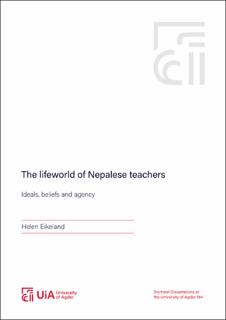| dc.contributor.author | Eikeland, Helen | |
| dc.date.accessioned | 2018-08-29T06:41:46Z | |
| dc.date.available | 2018-08-29T06:41:46Z | |
| dc.date.created | 2018-08-28T13:48:46Z | |
| dc.date.issued | 2018 | |
| dc.identifier.citation | Eikeland, H. (2018). The lifeworld of Nepalese teachers : Ideals, beliefs and agency [PhD. thesis]. University of Agder. | |
| dc.identifier.isbn | 978-82-7117-893-2 | |
| dc.identifier.issn | 1504-9272 | |
| dc.identifier.uri | http://hdl.handle.net/11250/2559735 | |
| dc.description.abstract | This study investigates aspects of Nepalese teachers’ lives and work through the portrayals of 12 teachers that are situated within their historical context by enquiring into why stories were told in particular ways at particular historical moments. The contextual considerations and the conceptual framework of the study emerged from the empirical data to present a perspective to further examine the teachers’ life histories. One of the purposes of the discussion of the Nepalese context is to try to frame the study within the teachers’ socio-historical context, while also recognizing that ideologies and policies are refracted in personal ways, focusing on both structure and individual agency.
Over the course of the study major revisions of the text and the theoretical approach of the enquiry had to be taken in response to the inadequacy of western theoretical concepts when considering the cultural foundations of the study. The open/ closed perspectives from Popper’s criticism of ideologies presents a way to view the Marxist movement in Nepal and also the EFA models based on the western origins of these influences. The local cultural foundations had to be viewed by a set of other perspectives based on a Hindu cultural heritage.
In this study the concepts of ideals, beliefs and agency emerged gradually during the progress of analysing the empirical data. On an individual level, the empirical data required a nuancing of the concept of teacher belief as a framework for analysing the life stories of teachers. The concept of teacher belief applied in a broad sense made it difficult to use as an analytical tool to view the data. The phenomena of ideals emerged from the data as somewhat different from the phenomena of teacher beliefs. In situations where deeply held values were challenged, then it seems that agency appeared to be closely connected to ideals rather than beliefs. The differentiation of these concepts and phenomena have emerged from the examination of life stories of the teachers in this study. | |
| dc.language.iso | eng | nb_NO |
| dc.publisher | University of Agder | nb_NO |
| dc.relation.ispartofseries | Doctoral dissertations at University of Agder; no. 194 | |
| dc.rights | Attribution-NonCommercial-NoDerivatives 4.0 Internasjonal | * |
| dc.rights.uri | http://creativecommons.org/licenses/by-nc-nd/4.0/deed.no | * |
| dc.title | The lifeworld of Nepalese teachers : Ideals, beliefs and agency | nb_NO |
| dc.type | Doctoral thesis | nb_NO |
| dc.description.version | publishedVersion | |
| dc.rights.holder | © 2018 Helen Eikeland | |
| dc.subject.nsi | VDP::Samfunnsvitenskap: 200::Pedagogiske fag: 280 | |
| dc.source.pagenumber | 256 | nb_NO |
| dc.source.issue | 194 | nb_NO |
| dc.identifier.cristin | 1605004 | |

